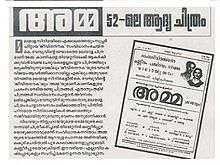Amma (1952 film)
| Amma | |
|---|---|
 | |
| Directed by | K. Vembu |
| Produced by | T. E. Vasudevan |
| Written by | Nagavally R. S. Kurup |
| Starring |
Thikkurissy Sukumaran Nair Lalitha B. S. Saroja Aranmula Ponnamma M. N. Nambiar T. S. Durairaj P. M. Devan Gopalan Nair T. S. Muthaiah Sharma Paul Vengola |
| Music by | V. Dakshinamurthy |
| Cinematography | V. Rajagopal |
| Edited by | R. Rajagopal |
Production company |
Associated Producers |
Release date |
|
| Country | India |
| Language |
Malayalam Tamil |
| Budget | ₹10 lakh |
Amma (English: Mother) is a 1952 Malayalam film directed by K. Vembu and written by Nagavally R. S. Kurup. The film is based on L.V Prasad's Telugu movie Shavukar. The film was a moderate success at the box office.[1] It was one of the two films that enjoyed success among the 11 Malayalam films which released in 1952, the other being Prem Nazir-starrer Visappinte Vili.[2]
The film was also made in Tamil with the same title Amma. Sandilyan wrote the dialogues.[3]
Plot
The film tells the tale of Lakshmi Amma, a loving mother, and her son Venu. Venu falls in love with Radha, a rich lady, and later marries her. After the marriage, Venu and Radha shifts to Madras. He manages to send some money to his mother in the beginning. But as days went, Radha intervenes and Venu is not able to send any more money to his poor mother. Meanwhile, a private moneylender from whom Lakshmi Amma had borrowed some money for Venu's marriage, kicks her out of the house. Venu brings Lakshmi Amma to his Madras residence but Radha is not ready to allow her to stay there. This creates problems and Lakshmi Amma has to leave the house. She is thrown to the streets. A lot of dramatic happenings form the rest of the story.
Cast
|
|
Soundtrack
Music was composed by V. Dakshinamurthy for both Malayalam and Tamil editions.
- Malayalam
There were 14 songs in the film and many were a hit. Lyrics were penned by P.Bhaskaran. Playback singers are V. Dakshinamurthy (debut), Gokulapalan (debut), Ghantasala (debut in Malayalam), Balakrishnan (AIR artiste) and P. Leela.[4]
- Tamil
Lyrics were penned by Chidambaram Varadarajan. One song by Mahakavi Bharathiyar was also included in the film. Singer is Lalitha while the Playback singers are Jikki, P. Leela, Jaanamma, V. Dakshinamurthy, Thiruchi Loganathan, Ghantasala, Gokulapalan and T. A. Mothi.[5]
Ammaave Deivam Ulaginile sung by Jikki and Idhai Yaarodum Sollavum Koodaadhu sung by T. A. Mothi and Janamma were hits.
| No. | Song | Singer/s | Lyricist | Duration (m:ss) |
|---|---|---|---|---|
| 1 | Jayamundu Bayamillai Maname | P. Leela | Mahakavi Bharathiyar | |
| 2 | Vedhanaiyaal Kann Kalangkida | Chidambaram Varadarajan | ||
| 3 | Ammaave Deivam Ulaginile | Jikki | ||
| 4 | Anaivarumae Varuveer | Lalitha & group | ||
| 5 | Padagae Namadhu Thunaiye | V. Dakshinamurthy, P. Leela & group | ||
| 6 | Aandavan Padaipilae | V. Dakshinamurthy & P. Leela | ||
| 7 | Nal Thiruvonam Varudhe | |||
| 8 | Vidhiyo Paingkili | Thiruchi Loganathan | ||
| 9 | Udamaiyum Varumaiyum | Ghantasala | ||
| 10 | Rohttu Maele Motaaru | |||
| 11 | Varuvaai Aasai Kiliye | Gokulapalan & Jikki | ||
| 12 | Vaazhvilum Thaazhvilum Maathaave | |||
| 13 | Varuga Varuga Yen Sodharikarl | Lalitha | ||
| 14 | Idhai Yaarodum Sollavum | T. A. Mothi & Jaanamma |
Reception
Both Malayalam and Tamil editions of the film fared well at the box office. The film is remembered for the outstanding acting by Aranmula Ponnamma. The film will also be remembered for the debut of Gokulapalan and Dakshinamoorthy as playback singers.[4]
References
- ↑ T. E. Vasudevan, P. Zakir Hussain (June 2014). "സിനിമയില് സത്യമില്ല സകലതും അഭിനയമാണ്" Archived 12 July 2014 at the Wayback Machine.. Madhyamam Weekly. Retrieved 3 July 2014
- ↑ Mohandas Kalariykkal. (April 2011). "അബ്ദുള് ഖാദര് പ്രേം നസീര് ആയ കഥ" (in Malayalam). Janmabhumi. Retrieved May 5, 2011.
- ↑ Film News Anandan (23 October 2004). Sadhanaigal Padaitha Thamizh Thiraipada Varalaru [History of Landmark Tamil Films] (in Tamil). Chennai: Sivakami Publishers. Archived from the original on 19 June 2017.
- 1 2 Vijayakumar, B. (30 August 2008). "AMMA 1952". The Hindu. Archived from the original on 19 June 2017. Retrieved 19 June 2017.
- ↑ G. Neelamegam. Thiraikalanjiyam — Part 1 (in Tamil). Manivasagar Publishers, Chennai 108 (Ph:044 25361039). First edition December 2014. p. 30.